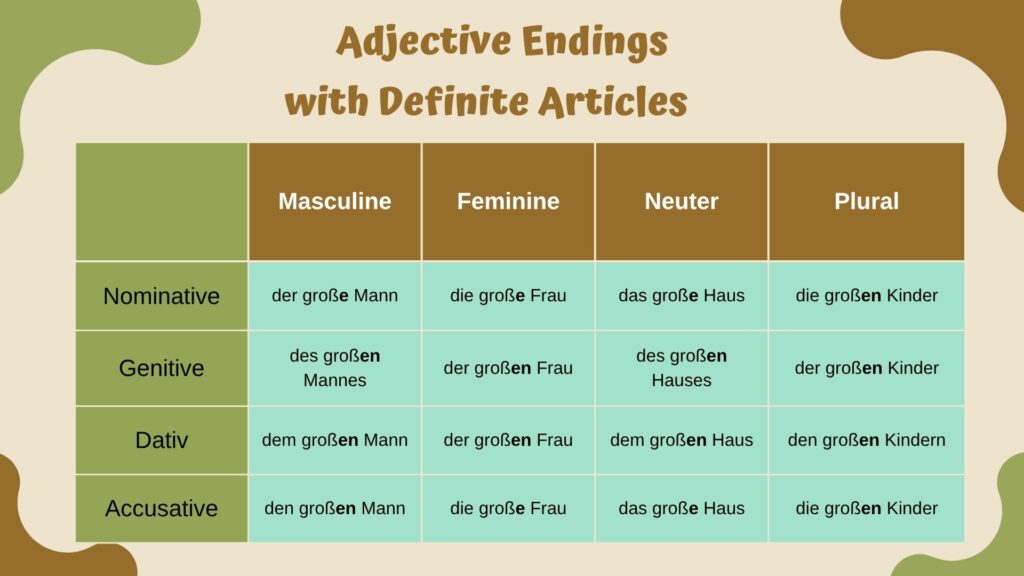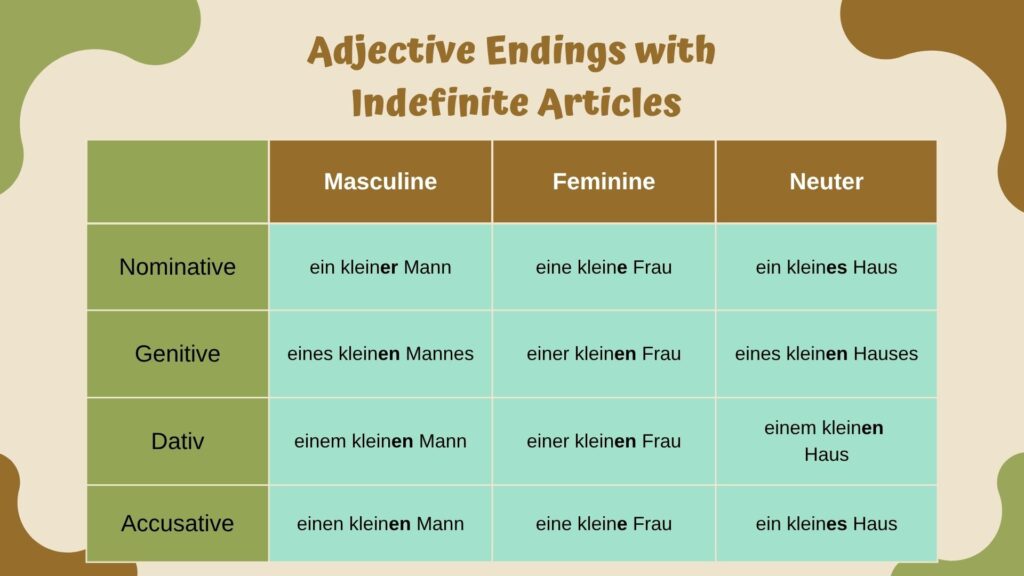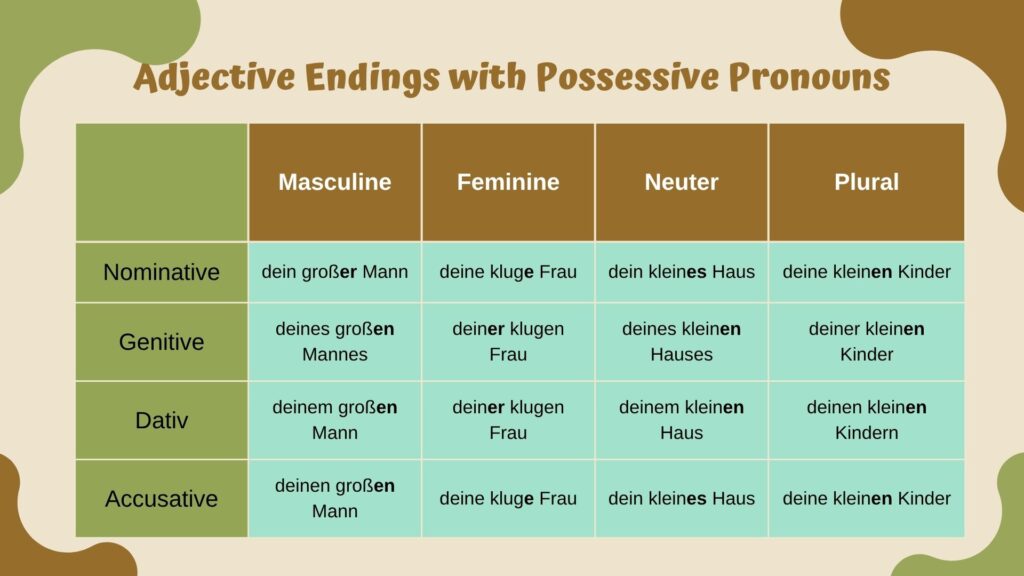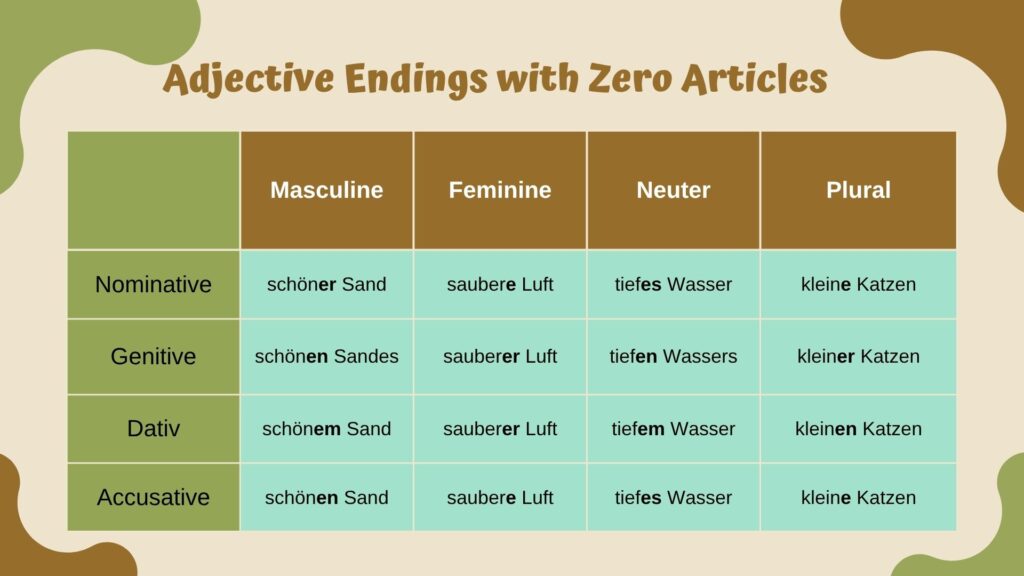What Is the German Adjective Declension?
German adjective declension is the system of changing adjective endings based on the noun’s article (definite, indefinite, possessive, or no article) and the case and gender of that noun. These endings signal important grammatical details. If you use the wrong ending, native speakers may still understand you, but it can sound off or confusing. An adjective in German agrees with its noun in both gender (masculine, feminine, neuter) and case (nominative, accusative, dative, genitive). This is why learners should already know German articles and German cases for a smoother experience.German Adjective Endings with ‘Der, Die, Das’ (Definite Articles)
When an adjective comes after a definite article (der, die, das), you usually use the "weak" endings. Below is an image illustrating common endings in each case and gender.
Example Sentences (Definite Articles)
- Der kleine Hund schläft. (Nominative) = The small dog sleeps.
- Ich sehe den kleinen Hund. (Accusative) = I see the small dog.
- Ich helfe dem kleinen Hund. (Dative) = I help the small dog.
Adjective Endings with ‘Ein, Eine’: Learn Indefinite Articles
After an indefinite article (ein, eine) or words like kein, you usually use "mixed" endings, which carry some markers similar to the definite articles.
Example Sentences (Indefinite Articles)
- Ein kleiner Hund schläft. (Nominative) = A small dog sleeps.
- Ich sehe einen kleinen Hund. (Accusative) = I see a small dog.
- Ich helfe einem kleinen Hund. (Dative) = I help a small dog.
Adjective Endings with Possessive Pronouns
Possessive pronouns (like mein, dein, sein, ihr) follow the similar pattern as indefinite articles.Example Sentences (Possessive Pronouns)
Comprehensive chart of German adjective declension with possessive pronouns, illustrating correct endings for all cases and genders.
- Mein kleiner Hund ist sehr aktiv. (Nominative) = My small dog is very active.
- Ich füttere meinen kleinen Hund. (Accusative) = I feed my small dog.
- Ich gehe mit meinem kleinen Hund spazieren. (Dative) = I go for a walk with my small dog.
Adjective Endings with Zero Articles

Example Sentences (Zero Articles)
- Guter Wein schmeckt lecker. (Nominative) = Good wine tastes delicious.
- Ich trinke guten Wein. (Accusative) = I drink good wine.
Common Mistakes with German Adjective Endings
Adjective endings can be tricky, and many learners make the same mistakes. Below are the most frequent errors and how to correct them.
❌ Mistake 1: Wrong Endings After Definite Articles
When using der, die, das, the adjective takes a weak ending (-e or -en).
🔴 Incorrect: Der großer Mann ist nett.
✅ Correct: Der große Mann ist nett.
❌ Mistake 2: Forgetting Strong Endings with No Article
If there is no article, the adjective must show case, gender, and number.
🔴 Incorrect: Ich trinke gut Wein.
✅ Correct: Ich trinke guten Wein.
❌ Mistake 3: Mixing Up Accusative and Dative Forms
Some learners use accusative endings instead of dative endings or vice versa.
🔴 Incorrect: Ich sehe schönem Sand.
✅ Correct: Ich sehe schönen Sand.
❌ Mistake 4: Using Weak Endings After Indefinite Articles
After ein, eine, kein, the adjective takes mixed endings, not weak ones.
🔴 Incorrect: Ein kluge Mann liest ein Buch.
✅ Correct: Ein kluger Mann liest ein Buch.
❌ Mistake 5: Forgetting Plural Endings
Adjectives in the plural must agree with case and article presence.
🔴 Incorrect: Ich sehe die kleine Hunde.
✅ Correct: Ich sehe die kleinen Hunde.
❌ Mistake 6: Ignoring Gender Rules
Some learners guess adjective endings instead of following gender rules.
🔴 Incorrect: Ich mag die schönes Auto.
✅ Correct: Ich mag das schöne Auto.
Practice German Adjective Endings with Free Quizzes
Mastering adjective endings takes practice. Test your knowledge with quizzes designed for different levels. These exercises will help you apply what you’ve learned and avoid common mistakes.
📝 Choose a quiz based on your level:
🎯 Why take these quizzes?
✔ Reinforce weak, mixed, and strong endings
✔ Get immediate feedback on your answers
✔ Learn from real sentence examples
🔗 Start practicing now: Click on a quiz and improve your German adjective skills!
Tips: How to Learn Adjective Endings
- Start with Definite Articles: Learn the endings after der, die, das. This helps you get used to the basic forms.
- Move on to Indefinite Articles: Master ein, eine next. Notice the similarities to definite articles.
- Understand Possessive Pronouns: Recognize they behave much like indefinite articles. Same patterns, just different words (e.g., mein, dein).
- Practice Zero Articles Last: See how strong endings replace missing article information. This final step solidifies all patterns.
- Spot Similarities: Mixed and weak endings often overlap. Identify repeated endings to reduce memorizing everything from scratch.
- Use Quizzes and Exercises: Check out our newest grammar quizzes for German adjective declension. Repetition is the key to long-term memory.
- Der kleine Mann geht mit der großen Frau ins Kino. (Definite articles)
- Ein kleiner Mann geht mit einer klugen Frau ins Theater. (Indefinite articles)
- Mein kluger Freund liest ein interessantes Buch. (Possessive pronoun)
- Gute Freunde helfen gern. (Zero article, nominative plural)

